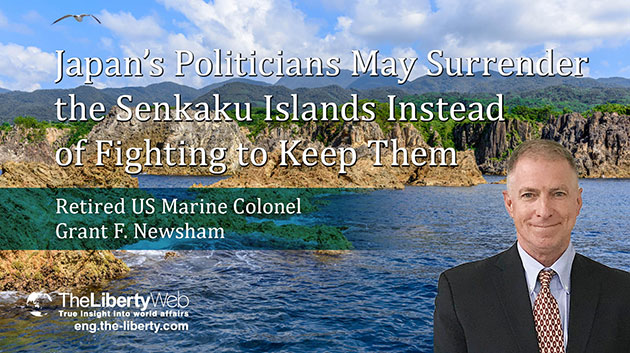Japan’s Politicians May Surrender the Senkaku Islands Instead of Fighting to Keep Them

He was born in 1956 in Virginia, U.S.A. He graduated from Principia College and UCLA School of Law. He served as a U.S. Marine Corps officer, to include duty as the Marine Corps attaché at the U.S. Embassy in Japan, and as the first Marine Liaison Officer to the Japan Self Defense Force.
A Retired Marine Corps officer, who worked in Japan for decades, spoke to The Liberty about the overlooked threat we are facing. He addressed the specific question: Will the Japanese government protect the Senkaku Islands?
What Could Lead Japan to Abandon the Senkakus?
—You pointed out the possibility of the Japanese government abandoning the Senkaku Islands.
Newsham: We can’t say for certain that the Japanese government will risk confronting China’s military for a few small islands like the Senkakus.
If China suddenly comes to the Senkakus with many ships, many aircraft and many fishing boats and says, “Okay, here we are. If you touch any Chinese person, we are going to shoot,” there’s the possibility that the Japanese government will back off without doing anything. We must understand this fact very carefully.
Remember that in 2012, China occupied Scarborough Shoal, the Philippines’ territory. The Obama administration only told each side to withdraw but did nothing else. They did not want to fight a war with China over some uninhabited rocks (and submerged rocks) and damage American business with China.
Currently, the Japan Business Federation (Keidanren) predicts that the Chinese economy will go through a V-shaped recovery after Covid eases off and will most likely recommend deepening relationships with China. This opinion will put pressure onto the Japanese government to submit to China.
Why isn’t anyone pointing out the possibility of Japanese politicians surrendering even before the Japan military fights?
Japan’s leaders go to great lengths to avoid confrontation
Newsham: Japanese politicians have a bad habit of ignoring what they should be confronting, and only addressing such problems when they appear in some visible and unavoidable form.
This was the case in the Great East Japan Earthquake as well. When the earthquake occurred, the Japanese government has not pre-planned how the Self-Defense Force and the U.S. military would move and operate together. As a result, despite having an alliance for more than 50 years, the scene was in turmoil and awkward for both sides, as if it was their first meeting. It was extremely embarrassing.
It is expected that it will be difficult for the Japanese and U.S. forces to cooperate in the Senkaku emergency, but the main reason for this is the Japanese politicians who avoid confronting the problem, and instead continue pushing it off for later.
Can China Be Stopped?
—What kind of effect will the attack on the Senkakus have?
Newsham: The psychological effect on the regional and international community will be immense. This is because the Asian nations are hoping that the U.S.-Japan military alliance is a force that can counter China. If the U.S. and Japan do not act even when the Senkaku Islands are unlawfully taken, then the rest of Asia and most of the world will believe, “no one can stop China anymore.”
However, if Japan clearly announces its intention of defending the Senkaku Islands, then the U.S. military will fully support Japan’s Self-Defense Force. I believe in this strongly.
The Self-Defense Force and the U.S. military conducted a joint training near Okinawa in August (photo on pg. 41). This is important if Japan and the US are going to deal with the countless Chinese ships that have been routinely approaching the Senkakus. If U.S.-Japan joint surveillance and operations in the area becomes routine, then we can deter China’s unlawful actions.
Asian “NATO”
—I believe a multinational military alliance, such as an Asian version of the North Atlantic Treaty Organization (NATO), is required to confront the Chinese threat.
Newsham: Exactly. It can be either a formal or informal alliance and need not be exactly like NATO. Currently, the number of Chinese military ships surpass that of the U.S. Navy (above diagram), and the U.S. military is not large or powerful enough to protect Asia’s peace by itself. Japan, Australia and India are likely to be interested. And nations like Singapore, Vietnam, and Indonesia might cooperate as well. South Korea might also join in, to some degree. The Philippines and Thailand are uncertain participants.
If Japan and the U.S. unite forces and involve other nations, then we can create a strong network not only in military terms but politically and economically as well.
Japan’s defense budget is too low to protect itself, much less Asia, from threats of China. The number of ships in the Japan Maritime Self-Defense Force is especially lacking. When they are conducting joint training with other nations, the Maritime Self Defense force can only send out one or two ships. Its scale of operations and presence is very small.
Rethinking Personnel Conditions to Attract More JSDF Recruits
Newsham: In addition, I’m worried about the poor treatment of the JSDF personnel. The servicemembers’ salaries are very low, their housing is old and they do not receive enough appreciation and respect from their fellow citizens – or the Japanese government. If the U.S. military was treated similar to the Self-Defense Force in Japan, few Americans would volunteer for the military.
When I first came to Japan, I worked as a diplomat at the US embassy and dealt with many elites in Japan’s Ministry of Foreign Affairs and Ministry of Finance, and other agencies. However, I eventually concluded that the people in the Self-Defense Force were the most impressive people out of all. They strived to be professional. They worked not for money or prestige, but for the nation.
This is why I’m confident that if more budget were allocated to them (and spent correctly) and they received political and emotional support from their citizens, the Self-Defense Force would become a very respectable military.
To combat the approaching dangers, there has to be some central command center for the ground, sea and air force of the Japanese military. Any military needs a joint operational capability that allows ground, sea and air forces to operate together, but the Self-Defense Force currently does not have this central command system nor capability. This creates the problem, for example, of the ground and air force not being able to support the Maritime Self-Defense Force smoothly if they move in to protect the Senkaku Islands.
Building an Effective Joint Strategy
Newsham: On top of that, it is essential to build a joint strategy between Japan and the U.S. The Maritime Self-Defense Force and the U.S. Navy are working well together and have for decades, but the US and Japanese ground and air forces are not nearly as interlinked as the MSDF and US Navy. Japan and the U.S. cannot respond to emergencies simply by deepening exchanges through occasional exercises followed by barbecues where the top leaders declare everything ‘just fine.’
Furthermore, the issue of training locations cannot be overlooked when discussing U.S.-Japan cooperation. The local governments routinely protest against the establishment of a military base or allowing military training by US forces. This is like a Yakuza “protection racket” squeezing money from the central government, which the central government is hard-pressed to accommodate. These issues are hindering cooperation between the U.S. and Japan.
The Need for Self Reliance and Equality
—You have criticized U.S.-Japan alliance as a “free ride.” How should a fair alliance look like?
Newsham: Japan is pathologically dependent on the U.S. military. It is as if Japanese politicans and others are so used to being protected by the U.S. that they believe they don’t need to protect their own country.
Some Japanese politicians believe that the U.S. military is some kind of “guard dog.” When crisis approaches, they ask for the help of U.S. military as if they are calling a taxi, and basically take an attitude that says, “U.S. soldiers, please die for Japan.” They think that the U.S. military is like a dog who will listen to whatever they say if they give food. As an American, I am enraged by this. It is a human-to-human relationship, so friction and resentment will occur if we’re not treated as equals – and vice versa.
This is my opinion, but there is a good example of this: The reason why the Maritime Self-Defense Force and the U.S. Navy was able to form a good alliance was because they thought of each other as equals from the very beginning.
In the 1950s after World War II, US Navy Admiral Arleigh Burke declared something like, “We consider the Japanese as equal friends,” as he went about working for the creation and development of the Maritime Self-Defense Force. Equality means requiring the same level of professionalism from the Japanese military as the U.S.
What we are facing now is a battle to protect human freedom. Japan is the higher manifestation of universal values such as freedom and democracy than China will ever be. The U.S. must work together with Japan as a country that protects these values. That is why an equal relationship is necessary at all times.



















